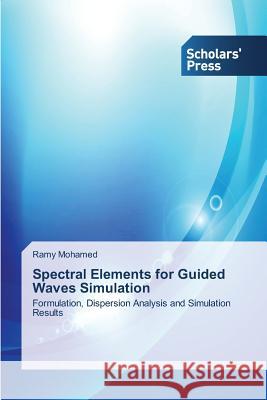Spectral Elements for Guided Waves Simulation » książka
Spectral Elements for Guided Waves Simulation
ISBN-13: 9783639513202 / Angielski / Miękka / 2015 / 284 str.
Structural health monitoring (SHM) is a novel technology, and like any new technological advancement it has yet not realized its full potential. It builds on advancements in several disciplines including nondestructive evaluation, smart materials, and embedded sensors and actuators. One of the enabling disciplines is the numerical simulation. SHM utilizes a variety of techniques, vibration based, impedance and guided ultrasonic waves. Guided waves offers a wide repertoire of advantages. The major challenge facing the full utilization of the numerical simulation in designing a viable guided waves based SHM System is the formidable computational requirements for accurate simulation. The main reason for these requirements is the dispersion induced by numerical discretization. The spectral element (SEM) is a variant of the p-version finite element (FEM) that offers certain remedies to the numerical dispersion errors problem, yet it lacks a systematic study of the numerical dispersion errors and its dependence on the meshing parameters. The present work attempts to fill that gap.
Structural health monitoring (SHM) is a novel technology, and like any new technological advancement it has yet not realized its full potential. It builds on advancements in several disciplines including nondestructive evaluation, smart materials, and embedded sensors and actuators. One of the enabling disciplines is the numerical simulation. SHM utilizes a variety of techniques, vibration based, impedance and guided ultrasonic waves. Guided waves offers a wide repertoire of advantages. The major challenge facing the full utilization of the numerical simulation in designing a viable guided waves based SHM System is the formidable computational requirements for accurate simulation. The main reason for these requirements is the dispersion induced by numerical discretization. The spectral element (SEM) is a variant of the p-version finite element (FEM) that offers certain remedies to the numerical dispersion errors problem, yet it lacks a systematic study of the numerical dispersion errors and its dependence on the meshing parameters. The present work attempts to fill that gap.











